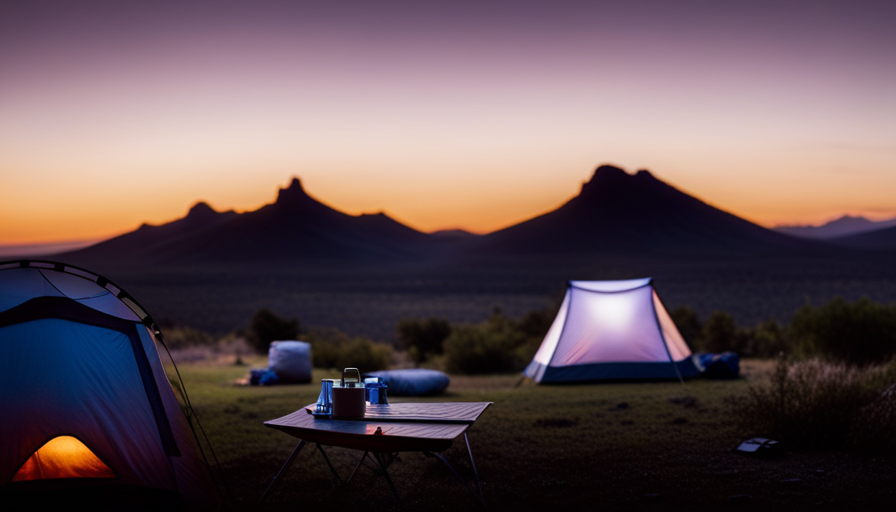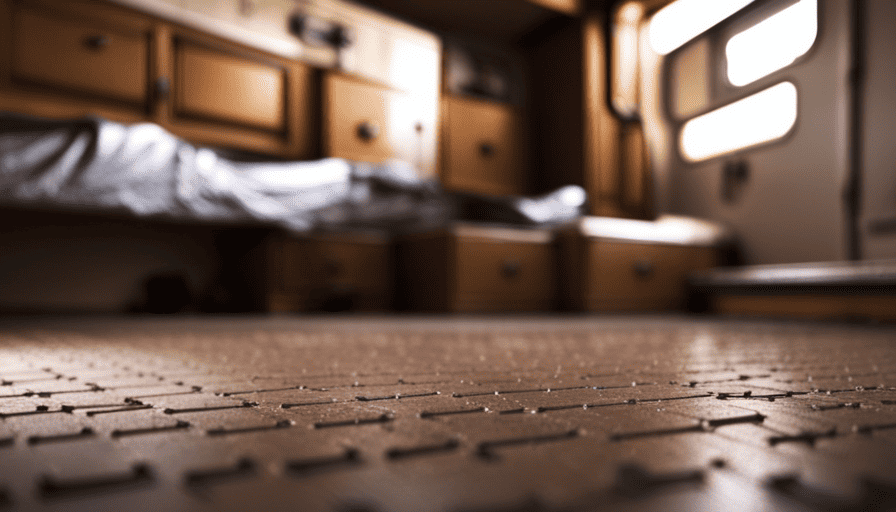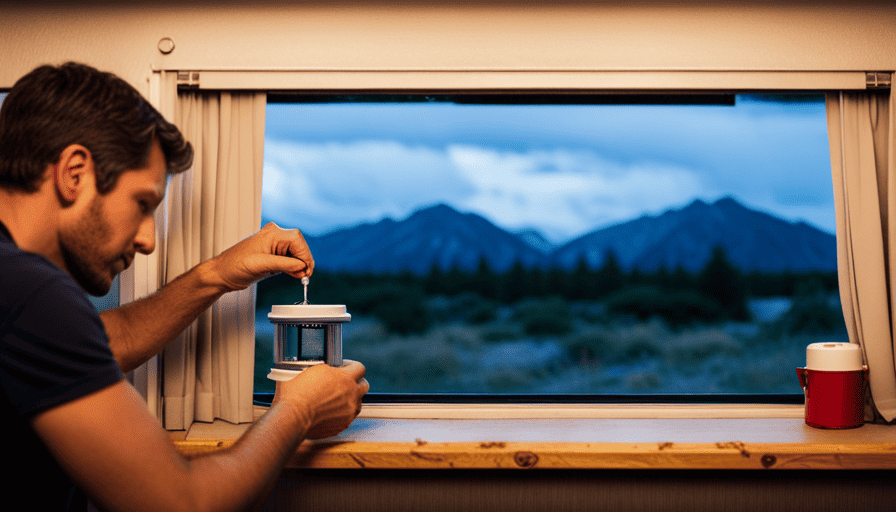Picture yourself driving along a scenic route, encompassed by stunning views, with the ability to wander wherever you please. For any camper, this is the ultimate fantasy. However, to truly make the most of your journey, you must ensure your camper is powered efficiently.
From charging your devices to running your appliances, having a reliable power source is essential. In this article, I will guide you through the process of powering your camper, ensuring that you have all the knowledge and tools to make the most of your journey.
We will delve into understanding your power needs, choosing the right power source, calculating your power consumption, and investing in energy-efficient appliances. I will also provide valuable insights on using power management systems, exploring portable power options, and planning for backup power.
Safety is paramount, so we will discuss safety guidelines and explore sustainable power solutions.
Get ready to embark on a camper-powered adventure like never before!
Key Takeaways
- Understanding power needs and evaluating power supply options are essential for powering a camper effectively.
- Calculate power consumption and consider the duration of camping trips to determine the capacity of the power source.
- Solar power and generators are popular options for powering a camper, with solar power being clean and renewable, and generators providing consistent and dependable power supply.
- Utilize energy-efficient appliances, LED lighting, and power management systems to optimize efficiency, conserve energy, and prolong battery life.
Understand Your Power Needs
You’ll need to understand your power needs before you can effectively power your camper and ensure you have all the necessary amenities for a comfortable and convenient camping experience. One of the first steps in understanding your power needs is to calculate how much electricity you’ll be using on a daily basis. This will help determine the size and type of power source you’ll need, whether it’s a generator, solar panels, or a battery bank. Additionally, knowing your power needs will also help you determine how to adjust regulator settings for optimal power output and efficiency. Understanding how to adjust regulator settings can help you make the most of your power source and ensure you have enough electricity to run all of your camper’s amenities without any issues.
To begin, evaluate the power supply options available to you. Consider whether you’ll be camping in locations with electrical hookups or if you’ll need to rely on a self-contained power source. This will determine the type and capacity of the power supply you’ll require.
Next, determine your electrical requirements. Make a list of all the appliances and devices you plan to use in your camper, such as lights, refrigerator, water pump, and entertainment systems. Check the power rating and voltage requirements for each item and calculate the total power consumption. This will help you determine the size and capacity of the power supply needed to meet your needs.
Additionally, consider the duration of your camping trips. If you plan on staying at a campground with electrical hookups, you may only need a power supply for short periods. However, if you prefer boondocking or off-grid camping, you’ll need a power source that can provide electricity for extended periods without access to external power.
By understanding your power needs, you can choose the right power source that’ll provide sufficient electricity for your camper. This’ll ensure that you have all the necessary amenities and comforts while enjoying your camping adventures.
Choose the Right Power Source
Make sure to select the correct power source for your recreational vehicle in order to keep all your appliances and devices running smoothly during your outdoor adventures.
When it comes to powering your camper, two popular options are solar power and generators. Solar power is a great choice if you want to harness the energy of the sun to charge your batteries and run your appliances. It’s a clean and renewable source of power that can be easily installed on the roof of your camper. However, solar power may not be suitable for all situations, especially if you plan on camping in areas with limited sunlight. In such cases, a generator can be a reliable backup power source.
Generators come in various sizes and fuel types, including gasoline, propane, and diesel. They provide a consistent and dependable power supply to meet your energy needs. With the right power source, you can ensure that your camper is equipped to handle all your power requirements.
Moving on to the next section, let’s calculate your power consumption and determine the right size of power source for your camper.
Calculate Your Power Consumption
To get a clear picture of how much energy your recreational vehicle consumes, it’s time to crunch some numbers and see how much juice your gadgets and appliances sip.
Calculating your power consumption is essential for determining the right power source and ensuring you have enough energy to support your needs on the road. Start by making a list of all the appliances and devices you plan to use in your camper, including their wattage.
Then, estimate the number of hours you’ll be using each item per day. Multiply the wattage by the number of hours to get the watt-hours consumed. Add up the watt-hours for all the appliances to determine your total daily power usage.
This will help you choose a power source that can meet your requirements. Additionally, understanding your power consumption will allow you to make informed decisions when it comes to investing in energy-efficient appliances, which can help minimize your power usage and extend your battery life on the road.
Invest in Energy-Efficient Appliances
Consider upgrading your appliances to energy-efficient models, which can help reduce energy consumption and maximize battery life while traveling. When it comes to powering your camper, every watt counts. Energy-saving tips and cost-effective appliances are key to achieving this goal.
Look for appliances that have the Energy Star label, as these are designed to use less energy without sacrificing performance. For example, consider swapping out your old refrigerator for a newer model that’s specifically designed for RVs and consumes less power. You can also invest in an energy-efficient air conditioning unit that cools your camper while minimizing energy usage. Additionally, LED lighting is a great option for saving energy as they use significantly less power compared to traditional bulbs.
When choosing appliances, pay attention to their power ratings and opt for those with lower wattage. This will ensure that you’re using as little energy as possible and prolong the life of your camper’s battery. By investing in energy-efficient appliances, you can enjoy the comforts of home while minimizing your energy consumption.
To further optimize your power usage, let’s explore the next section about using power management systems.
Use Power Management Systems
When managing your energy usage, it’s important to prioritize the use of power management systems that can help optimize efficiency and prolong battery life. Power management systems are essential tools for any camper looking to maximize their energy usage while on the road.
These systems offer a range of features and benefits that can make a significant difference in your overall power consumption. One of the key power management tips is to invest in a quality power management system that suits your specific needs. These systems can help regulate the flow of electricity, preventing excessive power usage and extending the lifespan of your batteries. They often come equipped with features such as voltage control, battery monitoring, and automatic shut-off functions, which can all contribute to better energy efficiency.
By using a power management system, you can effectively monitor and control the amount of power being used by different appliances in your camper. This allows you to prioritize your energy usage, ensuring that essential appliances receive power while less critical ones are switched off or put on a lower power setting. This not only helps conserve energy but also prevents potential battery drain.
Incorporating power management systems into your camper lifestyle can bring numerous benefits, including longer battery life, reduced power consumption, and increased energy efficiency. By optimizing your power usage, you can enjoy extended periods of off-grid camping without worrying about running out of power. With power management systems in place, you can now move on to the next section about practicing energy conservation.
Practice Energy Conservation
Make a conscious effort to conserve energy by adopting simple yet effective habits that will help you embrace a more sustainable and eco-friendly camping lifestyle. Here are some energy-saving tips to reduce power usage while enjoying your camper:
-
Turn off lights and electronics when not in use: It’s easy to forget to switch off lights or unplug devices, but doing so can significantly reduce your power consumption.
-
Utilize natural lighting: Make the most of daylight by keeping curtains open and using natural light during the day. This not only saves energy but also allows you to immerse yourself in the beauty of nature.
-
Opt for energy-efficient appliances: When purchasing appliances for your camper, choose those with energy-saving features. Look for the Energy Star label to ensure maximum efficiency.
-
Use power strips: Plug multiple devices into a power strip and switch it off when not in use. This prevents standby power consumption, also known as vampire power.
By implementing these energy-saving tips and reducing power usage, you can make your camping experience more sustainable and environmentally friendly.
When considering portable power options, you can explore various alternatives that will complement your efforts in conserving energy.
Consider Portable Power Options
Exploring different portable power alternatives can shed light on the effectiveness of energy conservation efforts during camping trips. When it comes to powering a camper, considering portable power options is essential. One popular choice is portable solar panels. These panels harness the power of the sun and convert it into usable electricity for your camper. They are lightweight, easy to set up, and environmentally friendly. Another option to consider is a portable generator. Generators can provide a reliable source of power for your camper, especially if you plan on using high-energy appliances such as air conditioners or microwaves. However, it’s important to choose a generator that is quiet and fuel-efficient to minimize noise pollution and reduce your environmental impact. To help you compare different portable power options, take a look at the table below:
| Portable Power Option | Pros | Cons |
|---|---|---|
| Portable Solar Panels | – Lightweight | |
| – Environmentally friendly | – Limited power output | |
| – Dependence on sunlight | ||
| Portable Generator | – Reliable power source | |
| – Suitable for high-energy appliances | – Noise pollution | |
| – Fuel consumption |
Considering these options can help you make an informed decision based on your camping needs and preferences. As you plan for backup power, it’s important to have a reliable alternative in case your primary power source fails.
Plan for Backup Power
Don’t forget to prepare for a backup power solution to ensure you can fully enjoy your camping experience without any worries. When it comes to powering your camper, having a reliable backup power source is essential.
One option to consider is increasing your battery capacity. This can be done by adding extra batteries or upgrading to a larger battery bank. By having a higher battery capacity, you’ll be able to power more appliances and devices for a longer period of time.
Another option to consider is incorporating solar panels into your camper’s power system. Solar panels are a great way to harness the sun’s energy and convert it into usable power. They can be mounted on the roof of your camper and connected to your battery bank. This allows you to charge your batteries during the day, even when you’re not connected to a power source.
By planning for backup power, such as increasing your battery capacity and incorporating solar panels, you can ensure that you have a reliable source of power while camping. This will allow you to fully enjoy your camping experience without any worries about running out of power.
Stay safe and follow safety guidelines to make the most of your time in the great outdoors.
Stay Safe and Follow Safety Guidelines
Remember, it’s crucial to prioritize safety and follow the guidelines to ensure a smooth and secure camping experience, so you can fully embrace the great outdoors. When it comes to powering your camper, it’s important to be prepared for emergencies and to take electrical safety measures seriously.
To ensure your safety, it’s essential to have an emergency preparedness plan in place. This includes having a first aid kit readily available, knowing the location of nearby medical facilities, and having a communication plan in case of emergencies. Additionally, make sure to familiarize yourself with the camper’s electrical system and know how to safely operate it.
To help you stay safe while powering your camper, here are some electrical safety measures to keep in mind:
- Always use a circuit breaker or ground fault circuit interrupter (GFCI) to protect against electrical shocks.
- Regularly inspect your electrical cords for any damage or wear and replace them if necessary.
- Avoid overloading electrical outlets by using power strips with built-in surge protectors.
- Keep flammable materials away from electrical equipment to prevent fires.
By following these safety guidelines, you can ensure a secure camping experience. Now, let’s explore sustainable power solutions for your camper.
Explore Sustainable Power Solutions
To ensure a green and eco-friendly camping experience, you can consider alternative energy sources for your outdoor adventures. One of the most popular options is to use solar panels to power your camper. Solar panels are a great way to harness the power of the sun and convert it into electricity. They’re easy to install and can be mounted on the roof of your camper.
During the day, the panels absorb sunlight and convert it into usable energy that can be stored in batteries. This stored energy can then be used to power your camper’s appliances and devices, such as lights, refrigerator, and phone chargers.
Another sustainable power solution to consider is wind turbines. These devices are designed to capture the wind’s energy and convert it into electricity. Wind turbines can be installed near your campsite, and they work best in areas with consistent wind flow.
The energy generated by wind turbines can be used to charge your camper’s batteries and power your appliances.
By incorporating solar panels and wind turbines into your camper’s power system, you can reduce your reliance on traditional power sources and minimize your carbon footprint. Not only will you be able to enjoy a self-sufficient camping experience, but you’ll also contribute to a cleaner and greener environment.
So, if you’re looking for sustainable power solutions for your camper, consider investing in solar panels and wind turbines.
Frequently Asked Questions
What are some tips for conserving energy while using power in a camper?
When it comes to conserving energy while using power in a camper, one interesting statistic to consider is that a typical camper can use up to 30% of its total energy just on lighting.
To save energy, calculating power usage is essential. Start by replacing traditional incandescent bulbs with LED lights, as they use up to 75% less energy.
Additionally, using natural sunlight during the day and utilizing energy-efficient appliances can greatly reduce power consumption in your camper.
Are there any portable power options for campers?
There are several portable power options available for campers, and one popular choice is solar panels. Solar panels are a great way to harness the power of the sun and convert it into electricity for your camper. They’re lightweight, easy to install, and can provide a reliable source of power during your camping trips.
With solar panels, you can charge your devices, run small appliances, and even power your lights without relying on traditional power sources.
How can I calculate my power consumption in a camper?
Calculating power usage is crucial for optimizing camper energy.
One interesting statistic to consider is that the average RV consumes about 30-50 amp-hours per day.
To calculate your power consumption, add up the wattage of all your appliances and devices, and multiply that by the number of hours you plan to use them.
This will give you an estimate of how much power you’ll need and help you choose the right portable power options for your camper.
What are some energy-efficient appliances that are suitable for use in a camper?
When it comes to outfitting a camper with energy-efficient appliances, there are a few key options to consider.
For lighting, LED bulbs are an excellent choice as they consume significantly less power than traditional incandescent bulbs.
Additionally, investing in solar power options such as solar panels or portable solar chargers can greatly reduce reliance on traditional power sources.
These solutions can help maximize energy efficiency and make your camper more sustainable on the road.
What safety guidelines should be followed when using power in a camper?
Safety precautions are essential when it comes to electrical installations in a camper. To ensure a secure power supply, it’s crucial to follow a few guidelines.
Firstly, make sure to use the correct gauge of wiring and never overload the circuits.
Additionally, regularly inspect the electrical system for any signs of damage or wear.
Always use proper grounding techniques and install GFCI outlets for added protection.
Lastly, never leave electrical appliances unattended and turn off all power sources before performing any maintenance.
What Are the Benefits of Powering a Camper Off Grid?
When it comes to powering a camper off grid, there are numerous benefits. Firstly, it allows for greater freedom and flexibility in choosing camping locations since you are not reliant on designated campsites with electrical hookups. Additionally, it promotes sustainability by reducing reliance on traditional energy sources and minimizing your carbon footprint. Moreover, powering a camper off grid allows for a more immersive and authentic camping experience, as you can fully disconnect from the modern world and enjoy tranquility in nature.
Conclusion
As I wrap up my journey through the world of powering a camper, I can’t help but compare it to sailing the open seas. Just like a skilled sailor, I’ve learned to navigate the vast ocean of power needs, choosing the right source and calculating consumption.
I have discovered the power management systems that keep everything in balance, just like a ship’s crew. And like a seasoned captain, I’ve planned for backup power, ensuring a smooth voyage.
So set sail on your camper adventure, armed with sustainable power solutions, and let the winds of efficiency guide you.










